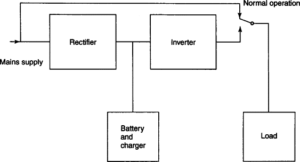What is UPS System?
UPS is short for Uninterruptable Power Supply. An Uninterruptable Power Supply is a device that provides power to a system even when the original power supply is not functioning. The most common use of an Uninterruptable Power Supply is to provide power to a computer system in the event of a power outage. UPS systems are also used to protect electronic devices from power surges.

The UPS can be online or offline. Both systems use a d.c. link inverter with a battery bank and trickle-charger. In the case of the off-line system, in normal operation power is supplied directly from a.c. mains
UPS systems are devices that supply emergency power to a load when the input power source fails. A UPS differs from an auxiliary or emergency power system or standby generator in that it will provide near-instantaneous power by supplying energy stored in batteries, supercapacitors, or flywheels, thus eliminating the startup delay of standby generators and providing significantly longer runtime than auxiliary power systems.
What is UPS?
UPS is an abbreviation for Uninterrupted Power Supply. It is a device that helps to provide backup power in the event of a power outage. UPS systems are used in both home and office settings to protect electronic equipment from damage due to power surges. There are different types of UPS systems available on the market, each designed for different purposes. The most common type of UPS system is the standby UPS, which is used to provide power backup for computers and other devices in the event of a power outage.
Why use UPS?
UPS systems provide many benefits for businesses, including improved security, reliability, and efficiency. In addition, UPS systems can help to protect against power outages, voltage fluctuations, and other issues that can disrupt operations.
Applications of UPS
Applications of UPS systems include medical facilities, life-supporting systems, data storage, and computer systems, emergency equipment, telecommunications, industrial processing, and online shopping. UPS systems are used to power and protect delicate medical equipment, life-supporting systems, data storage, computer systems, emergency equipment, and telecommunications.
UPS systems are used to power and protect delicate medical equipment, life-supporting systems, data storage, computer systems, emergency equipment, and telecommunications. UPS systems are used to power and protect delicate medical equipment, life-supporting systems, data storage, computer systems, emergency equipment, and telecommunications.
There are a variety of UPS systems available on the market, each with its own set of advantages and disadvantages. Selecting the right UPS system for your needs depends on a number of factors, including the type of equipment you need to protect, the level of protection you require, and your budget.
Some of the most common applications for UPS systems include:
1. Computer systems: A UPS can provide backup power to computers and other electronic equipment in the event of a power outage or fluctuation. This can help prevent data loss and ensure that critical systems remain operational.
2. Telephone systems: A UPS can keep telephone systems up and running during a power outage, preventing disruptions to service.
3. Security systems: A UPS can keep security cameras and alarm systems operational during a power outage, providing an extra layer of protection for your home or business.
4. Medical equipment: A UPS can keep life-saving medical equipment operational during a power outage, ensuring that patients receive the treatment they need.
Top Advantages of Using Power Backup and UPS
- Uncertain Data Loss Can Be Prevented:
- Emergency Power Supply:
- Protects the Voltage Sensitive Device from Bad Electricity:
- Provides Surge Protection:
- Maintains Battery Life:
- Huge Power Back Up in the Industries:
What are the types of UPS
UPS systems are divided into three types based on how power flows through the unit: standby, line-interactive and online double-conversion.
How does UPS work?
When incoming utility power drops below or surges above safe voltage levels, the UPS switches to DC battery power and then inverts it to AC power to run connected equipment. … They provide power during such events as a blackout, voltage sag, voltage surge, or over-voltage.
UPS price
Do people also ask Questions?
1. What are the types of UPS?
A. Here there are three types of Uninterrupted Power Supplies (UPS) Static, Dynamic, and Hybrid.
2. What are the applications of UPS?
A. The UPS System applications include telecommunications, Medical facilities which are life-supporting systems and emergency equipment, data storage, computer systems, and online management systems.
3. What are the advantages of UPS?
A. It provides Surge protection and prevents uncertain data loss and the emergence of power supply.
4. What are UPS systems?
A. UPS is nothing but an uninterruptible power supply system when the input power supply fails then automatically provides an emergency power supply to the load.
5. How efficient is UPS?
A. The efficiency of UPS generally ranges from 92% to 95%.
Conclusion
To conclude, UPS is a great tool to have in any business or organization. It provides clean and uninterruptible power which is essential for many businesses. There are different types of UPS available on the market, so it is important to choose the one that best suits your needs. We hope this article has helped you understand the different applications and types of UPS so that you can make an informed decision when choosing one for your business.


